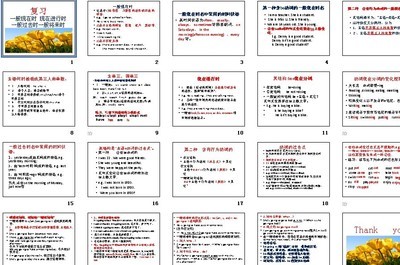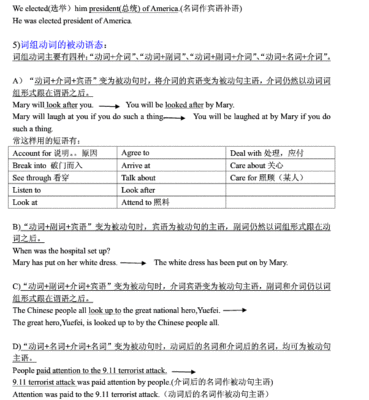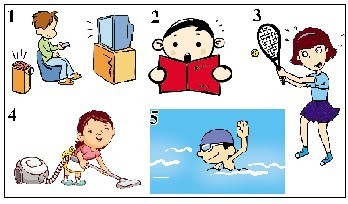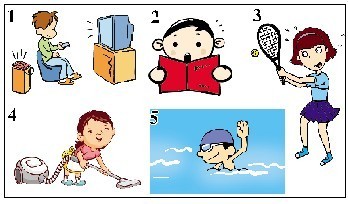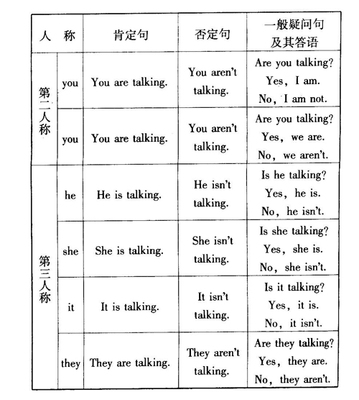一般现在时讲解及练习
一. 用法
1 )它表示经常性、习惯性的动作或存在的状态。
e.g. I goto school on foot.
He is very busy now.
2)它表示主语的特征、性格、能力、爱好等。e.g.I work hard. He workshard.
I like watching TV. Shelikes watching TV.
3)它表示客观真理
e.g. There are seven days in a week.
The moon moves round the earth.
其结构按正常语序,即“主语+谓语+其它”。
二.其疑问句否定句变化可分为两种情况,实意动词和be动词
实意动词又分为两种:1)表示动作,一般人称作主语的,变否定句须在动词前加助动词don’t;变一般疑问句须在句首加助动词do。E.g. Theyhave lunch at 12:00. They don’t have lunchat 12:00. Dothey have lunch at 12:00?
2)单三人称做主语的,变否定句须在动词前加助动词doesn’t;变一般疑问句须在句首加助动词does。
E.g. Jennyspeaks English very well.
Jenny doesn’t speak English very well.
Does Jenny speak English very well?
3)含有be动词的要在be上做变化.
E.g. Danny is a good student.
Danny isn’t a good student.
Is Danny a good student?
三、第三人称单数时,英语动词的变化规则
动词,在英语众多词汇中堪称变脸的高手,遇到不同的人称、数和时态,它总会以不同的面孔登场。一下是一般现在时态中当主语是第三人称单数英语动词的变化规则。
主语为第三人称单数的动词变化主要体现在词尾的变化上,其规律大体有三点:
1.一般情况下,直接在动词词尾+s ,例如:get→gets;take→takes
2.以s, sh, ch, x, o 结尾的动词,在词尾+ es,
例如:teach→teaches; fix→fixes;go→goes
3.以辅音字母+ y 结尾的动词,变y 为,再+ es,
如:study→studies; try→tries
除上述规律外,还应注意下面三点:
1.动词have ,遇到主语是第三人称单数时,要用has动词be的第三人称单数形式是is。
2.含有动词第三人称单数形式的句子变否定句时,要用doesn't + 动词原形,如:
He goes to schoolat six in the morning. (变否定句)→He doesn't go to school at six in themorning.
3.对含有动词第三人称单数形式的句子提问时,要用助动词does,如:Shegoes home at five every day. (对划线部分提问)→When / What time does she go home everyday?
综上所述,只要我们洞悉了英语动词第三人称单数形式的变化规则,在一般现在时的句子中,我们都能从容应对,客随主“变”了。
大家都知道,在一般现在时中,当主语是第三人称单数时,谓语动词要用第三人称单数形式,即常在动词原形-s或-es。但有些同学们对于哪些主语是第三人称单数还不十分清楚,现归纳总结如下:
一)、人称代词he, she, it是第三人称单数。如:Helikes watching TV. 他喜欢看电视。
She has lunch attwelve. 她十二点吃午餐。looks like a cat. 它看起来像只猫。
二)、单个人名、地名或称呼作主语;是第三人称单数。如:
①Han Mei looks like her mother. 韩梅看起来像她的母亲。
②Beijing is in China. 北京在中国。
③Uncle Wang often makes cakes. 王叔叔经常做蛋糕。
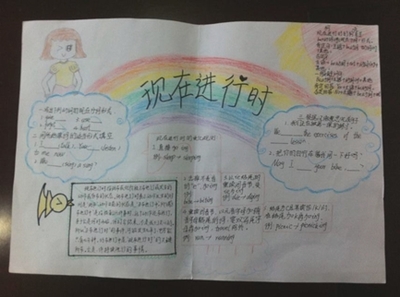
三)、单数可数名词或"this / that / the+单数可数名词作主语时,是第三人称单数。如:
①A horse is a useful animal. 马是有用的动物。
②This book is yours. 这本书是你的。
③That car is red. 那辆小汽车是红色的。
④The cat is Lucy's. 只猫是露茜的。
四)、不定代词someone, somebody, nobody, everything,something等及指示代词this,that
作主语时,是第三人称单数。如:
①Everyone is here. 大家到齐了。
②There is something wrong with the watch.这块手表有毛病。
③This is a pen. 这是一支钢笔。
④That is an eraser. 那是一块橡皮擦。
五)、不可数名词作主语时为第三人称单数。如:
①The milk is in the glass.牛奶在玻璃杯里。
②The bread is very small. 那面包很小。
六)、当数字或字母作主语时,看作第三人称单数。如:
①"6" is a lucky number. "6"是个吉利数字。
②"I" is a letter. "I"是个字母。
四、其时间状语为often、usually、always、sometimes等频率副词,onSaturdays、in themorning(afternoon evening) 、everyday 等。
五、做题时常见错误如下:
一)be动词与行为动词同时出现在句子中(不是每个英文句子都需要be动词)
例:We areplant(plant) the trees in spring.
答案:plant解析:学生往往会用汉语的思维方式去翻译,就成了“我们是在春天植树”。这是学习英语最忌讳的,要看语法是不是正确,在英语中,be是表状态,do是表动作,两种动词不能同时出现在句子中,可记住如下口诀:“英汉语言有差异,be、do不能放一起。”
二)、现三单的动词变化错误:
例:1 Heplaies (play) football very well.
2Danny gos (go) to school at 7:10.
答案:1plays 2goes
解析:1以辅音字母加y结尾的动词变单三人称形式才能把y换成i再加es;
2与名词变复数不同,变单三人称形式以o结尾的词要加es.
三)、在句式变换时易出错
例:1 DoesJenny has (has) a good friend?
2Brian doesn’t lives (not live) in China.
答案:1Doeshave2 doesn’t live
解析:单三人称做主语的一般现在时做句式变化时,可记住如下口诀:“见助动,用原形”。此口诀也可推广用于一般过去时态中。e.g.He didn't go home yesterday.
四)、对do的理解易出错
例:Wedon’t (not do) our homework in the afternoon.
答案:don’tdo 解析:do是一个比较难理解的词,它有三个含义:a)是所有行为动词的总称;b)是助动词,无实义;c)是一个具体的行为动词“做,干”。此句中给出的do指“做,干”,not指把此句变为否定句,故须在do前加助动词don’t。
五)、对主语的数判断有误
例: LiMing with me are (be) in Beijing.
答案:is 解析:表面一看是“我和李明两个人在北京”,但with在此做伴随状语,不能做主语,故用is.LiMingand me are inBeijing.
专项练习:
一、 单选
1Jenny ____ in an office. Her parents ____in ahospital.
AworkworksB works work C work areworkingD isworkingwork
2 Oneof the boys_____ a black hat.
Ahave Bthere is Cthere areD has
3 Wewill go shopping if it____ tomorrow.
Adon't rainBdidn't rain Cdoesn'trainDisn't rain
4 Hesaid the sun ____in the east and ____in the west.
Arose; set Brises; sets C rises,set Drise; sets
5 WangMei ____ music and often ____ to music.
Alike; listenB likes; listensC like; are listeningD liking ; listen
6Jenny____ English every evening.
A hasstudy Bstudies Cstudy Dstudied
答案:1B2D3C4B5B6B
二、填空
1 Ican take Li Ming there when he _____ ( come) tovisit.
2_____your sister_____(know)English?
3Herhome_______________(远离)herschool.
4Thepot_____(not look) like yours very much.
5Where _____you____(have)lunch every day?
6Who_____(想要)to goswimming?
7______she_____(do) the housework every day?
8Jenny and Danny usually______(play) games in the afternoon.
答案:1comes 2Doesknow 3 isaway from4 doesn't look
5 do have6 wants 7doesdo 8play
另外,宾语从句中,从句部分若是表示客观真理,不管主句是何时态,从句都要用一般现在时;在时间和条件状语从句中,主句表将来,从句要用一般现在时。
一般现在时练习
用所给词的正确形式填空
1. We often___________(play) on the playgound.
2. He _________(get) up at six o’clock.
3. __________you _________(brush) your teeth everymorning.
4. What____ (do) he usually _____(do) after school?
5. Danny _______(study) English, Chinese, Maths, Science and Art atschool.
6. Mike sometimes __________(go) to the park with hissister.
7. At eight at night, she ________(watch) TV with hisparents.
8. ________ Mike________(read) English every day?
9. How many lessons ______your classmate____(have) onMonday?
10. What time ____his mother_________(do) thehousework?
11. He often______(have) dinner at home. 12. Daniel andTommy___ (be) in Class One.
13. We____ (notwatch) TV on Monday.14. Nick _____(not go) to the zoo on Sunday.
15. They______(like) the World Cup? 16.What ____they often ____(do) on Saturdays
17. Yourparents________ (read) newspapers every day?
18. Thegirl______ (teach) us English on Sundays.
19. She and I_______(take) a walk together every evening.
20. There_______(be) some water in the bottle. 21. Mike ______(like)cooking.
22. They_______(have) the same hobby. 23.My aunt______ (look) after her baby carefully.
24. Youalways____ (do) your homework well. 25.I_____ (be) ill. I’m staying in bed.
26. She_____ (go)to school from Monday to Friday.27. Liu Tao _____(do) not like PE.
28. The childoften______ (watch) TV in the evening.
29. Su Hai and SuYang ______(have) eight lessons this term.
30.-What day______(be) it today? - It’sSaturday.
31. Don’t make a noise. Grandpa __________(sleep).
32. Tom’s family__________(watch) TV.
33. It ________(take) me two hours to finish my homework lastnight.
34. What ______ your mother _______(do) every evening? She_______(wash) clothes.
35. _______ it ______ (rain)every day?
36. What _______(do) you _______ on Sundays ? We ________ (play)football.
37. There ________ (be) a football match on TV everymorning.
38. Theyoften ________ (visit) the Great Wall.
39. Who _______ (dance) the best in your class?
40. He _____________ (not come).
41. The earth __________ (move) round the sun.
42 She ________ (buy) a sweater.
43. Mr. Wang often______( go) to Shanghai.
改句子
1. Do you often play football after school? (肯定回答)
2. I have many books. (改为否定句)
3. Gao Shan’ssister likes playing table tennis (改为否定句)
4. She lives in a small town near New York.(改为一般疑问句)
5. I watch TV every day. (改为一般疑问句)
6. David has a goal. (改为一般疑问句)
7. We have four lessons.(否定句)
8. Nancy doesn’trun fast (肯定句)
9. My dog runs fast. (一般疑问句)(把10—14小题变否定句,一般疑问句和划线提问)
10. Mikehas two letters for him.
11. Iusually play football on Fridayafternoon
12. SuYang usually washes some clothes onSaturday.
13.Mingming usually waters the flowers everyday
14. Tomdoes his homework at home.
写出下列动词的第三人称单数形式:
1.wash_________ match _______guess______ study______ finish_________go________ snow______ carry_________
2.stop______ see________ drive ________let_______ carry______keep_____ join______ find_______ think________ teach______catch______
3.stay_______ begin______ forget_______ forget______ lie________ die_______ run_______ prefer______ give________ ring_______dance______ hope_______
单项选择:
1.There _____ an English film at the cinema now.
A.will have B. is going to have C. is going to be D.is
2. Thepicture _______ nice.
A.looks B. is looked C. look D. is looking
3. She______ down and soon falls asleep.
A.live B. lain C. laid D. sits
4.They _____ the office in time very morning.
A.reach to B. arrived C. went D. get to
5. Weshall go to Shanghai on business before you _____ back nextweek.
A.will come B. came C. would come D. come
6. Theplane ______ over there.
A. isB. areC.am D. was
7. Isee her ____ the room this morning.
A. toenter B.entered C.enter D.enters
8. Theteacher ________us to come to school ontime.
A.askB. askingC.asks D.asked
9.John always ______ others.
A.help B. helping C. helps D. to help
10. He______for eight hours every day.
A.working B. to work C. works D.worked
11.You’d better ______ at home and ______ yourhomework.
A. tostay, do B. stay, do C. to stay, to do D. stay, todo
12. Hesits down and ______ a rest.
A.having B. have C. to have D. has
13.Uncle Wang never ______ a cake.
A.make B. to make C. making D.makes
翻译
1.他在第三小学上学。他每天早上七点上学。(No.3 Primary School)
2.父亲每天早晨都浇花。
3.我女儿喜欢看电视和听音乐。
4.桑迪放学后打乒乓球吗?不。她学习很用功。放学后她总是看书。
5 我们九点上科学
6 我最喜欢的课是英语
7我们不是2:30上化学
8 你们是下午3点回家吗
9 8点开始上课
10 我爸爸周日早上看报纸
11 她天天做作业
改错 1. Is yourbrother speak English?
2. Does he likes going fishing?
3. He likes playgames after class.
4. Mr. Wu teachsus English.
5. She don’t doher homework every evening.
作文:My School Day
_________________________________________________________
___________________________________________________________
________________________________________________________________
____________________________________________________________
_______________________________________________________________
_______________________________________________________________
_______________________________________________________________
_______________________________________________________________
 爱华网
爱华网